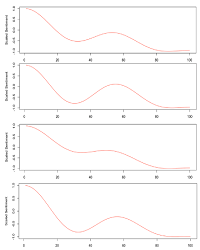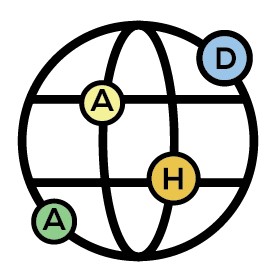Sentiment Analysis in Translation: A Pilot Experiment for Multilingual DH Contexts
DOI:
https://doi.org/10.24215/27187470e051Keywords:
sentiment analysis, translation, Digital Humanities, textual analysis, Latin America literatureAbstract
As a plenary speaker of the Fifth AAHD Congress, I presented several methodologies that I apply to literary studies experimentally. Using an experiment on sentiment analysis as an example, I justify the need to account for multilingual DH environments from my bilingual experience in the United States, within digital humanities in general and workshops to propose pilot experiments with existing methodologies, as prototypes to start working on text analysis in different languages. This article does not claim that the method used here is the best linguistic or cultural approach for sentiment analysis of Hispanic American cultural products. However, it defends the potential of exploring available techniques to create more inclusive spaces in rapid learning scenarios and in which, generally, the literary texts used belong to the Anglo-Saxon canon.
Downloads
References
Alkorta, J., Gojenola, K. e Iruskieta, M. (2019). Towards discourse annotation and sentiment analysis of the Basque Opinion Corpus. En A. Zeldes, D. Das, E. Maziero Galani, J. D. Antonio y M. Iruskieta (Eds.), Proceedings of the Workshop on Discourse Relation Parsing and Treebanking 2019 (pp. 144-152). Association for Computational Linguistics. https://doi.org/10.18653/v1/W19-2718
Beigel, M. F. (2014). Publishing from the periphery: Structural heterogeneity and segmented circuits. The evaluation of scientific publications for tenure in Argentina’s CONICET. Current Sociology, 62(5), 743-765. https://doi.org/10.1177/0011392114533977
Beigel, M. F. (2019). Indicadores de circulación: una perspectiva multi-escalar para medir la producción científico-tecnológica latinoamericana. Ciencia, Tecnología y Política, 3. https://doi.org/10.24215/26183188e028
del Rio Riande, G., y Fiormonte, D. (2022). Una vez más sobre los sures de las digital humanities. Acervo, 35(1). https://revista.an.gov.br/index.php/revistaacervo/article/view/1850/1711
Fiormonte, D. (2021). Taxation against overrepresentation?: The consequences of monolingualism for Digital Humanities. En D. Kim y A.
Koh (Eds.), Alternative historiographies of the Digital Humanities (pp. 333-376). Punctum Books. https://www.jstor.org/stable/j.ctv1r7878x.13
Fradejas Rueda, J. M. (Ed.) (2022). Cuentapalabras. http://www.aic.uva.es/cuentapalabras/
Henríquez Miranda, C. y Guzman, J. (2017). A review of sentiment analysis in Spanish. Tecciencia, 12(22), 39-49. http://dx.doi.org/10.18180/tecciencia.2017.22.5
Irizarry, E. (1997). Informática y literatura. Anthropos.
Isasi, J. (2021). Análisis de sentimientos en R con syuzhet. Programming Historian en Español, 5. https://doi.org/10.46430/phes0051
Isasi, J. y del Rio Riande, G. (2022). ¿En qué lengua citamos cuando escribimos sobre Humanidades Digitales? Revista de Humanidades Digitales, 7, 127-143. https://doi.org/10.5944/rhd.vol.7.2022.36280
Jockers, M. (2017). syuzhet: Extracts Sentiment and Sentiment-Derived Plot Arcs from Text (1.0.7) [Software]. CRAN. https://cran.r-project.org/web/packages/syuzhet/index.html
Mohammad, S. (s. f.). NRC Emotion Lexicon. Recuperado el 1 de octubre de 2023, de https://saifmohammad.com/WebPages/NRC-Emotion-Lexicon.htm
Mohammad, S. (2011). From once upon a time to happily ever after: Tracking emotions in novels and fairy tales. En K. Zervanou, P.
Lendvai (Eds.), Proceedings of the 5th ACL-HLT Workshop on Language Technology for Cultural Heritage, Social Sciences, and Humanities (pp. 105-114). Association for Computational Linguistics. https://aclanthology.org/W11-1514
Mohammad, S. M. y Turney, P. D. (2013). Crowdsourcing a Word–Emotion Association Lexicon. Computational Intelligence, 29(3), 436-465. https://doi.org/10.1111/j.1467-8640.2012.00460.x
Moreno-Ortiz, A. (2017). Lingmotif: Sentiment analysis for the Digital Humanities. En A. Moreno-Ortiz (Ed.), Proceedings of the Software Demonstrations of the 15th Conference of the European Chapter of the Association for Computational Linguistics (pp. 73-76). Association for Computational Linguistics. https://aclanthology.org/E17-3019
Mosteller, F. y Wallace, D. (1964). Inference and disputed authorship: The Federalist. Addison-Wesley.
Ortega, É. (2019). Zonas de contacto: A Digital Humanities ecology of knowledges. En M. K. Gold y L. F. Klein (Eds.), Debates in the Digital Humanities 2019. University of Minnesota Press. https://dhdebates.gc.cuny.edu/read/4805e692-0823-4073-b431-5a684250a82d/section/aeee46e3-dddc-4668-a1b3-c8983ba4d70a
Priani Saisó, E., Spence, P., Russell, I. G., García, E. G. B. y Alves, D. (2014). Las humanidades digitales en español y portugués. Un estudio de caso: DíaHD/DiaHD. Anuario Americanista Europeo, 12(2).
Risam, R. (2018). New digital worlds: Postcolonial Digital Humanities in theory, praxis, and pedagogy. Northwestern University Press.
Rodríguez Aldape, F. M. (2013). Cuantificación del interés de un usuario en un tema mediante minería de texto y análisis de sentimiento. [Tesis de Maestría, Facultad de Ingeniería Mecánica y Eléctricac, Universidad Autónoma de Nuevo León]. https://cd.dgb.uanl.mx/handle/201504211/5662
Siko, B., Sengupta, A., Allmann, K. y Pozo, C. (2018). Decolonizing the internet. Whose Knowledge? Recuperado el 1 de octubre de 2023, de https://whoseknowledge.org/wp-content/uploads/2018/11/DTI-2018-Summary-Report.pdf
Sivertsen, G. (2018). Balanced multilingualism in science. BiD: Textos Universitaris de Biblioteconomia i Documentació, 40. https://doi.org/10.1344/BiD2018.40.25
Srinivasan, S., Comini, N., Koltsov, M. y Gelvanovska-Garcia, N. (2022). Acceso y uso de Internet en América Latina y El Caribe. Resultados de las encuestas telefónicas de alta frecuencia ALC 2021. Grupo Banco Mundial.
Vonnegut, K. (1994). Welcome to the monkey house and palm sunday: An autobiographical collage. Vintage.
Whose Knowledge?: Re-imagining and re-designing the internet to be for and by us all. (2021). Whose Knowledge? Recuperado el 1 de octubre de 2023, de https://whoseknowledge.org/wp-content/uploads/2021/04/WK-Prospectus-2021.pdf

Downloads
Published
How to Cite
Issue
Section
License
Copyright (c) 2023 Jennifer Isasi

This work is licensed under a Creative Commons Attribution-ShareAlike 4.0 International License.
Los autores que publican en esta revista están de acuerdo con los siguientes términos:
- Los artículos publicados en la revista se encuentran disponibles en acceso abierto.
- Los autores conservan los derechos de autor y garantizan a la revista el derecho de ser la primera publicación del trabajo al igual que licenciarlo bajo una Licencia Creative Commons Atribución-CompartirIgual 4.0 Internacional (CC BY-SA 4.0), que permite copiar y redistribuir el material en cualquier medio o formato y remezclar, transformar y construir a partir del material bajo los siguientes términos: debe dar crédito de manera adecuada, brindar un enlace a la licencia, e indicar si se han realizado cambios.
- Los autores pueden depositar el trabajo en un repositorio de preprints, postprints, establecer por separado acuerdos adicionales para la distribución no exclusiva de la versión de la obra publicada en la revista (por ejemplo, situarlo en un repositorio institucional o publicarlo en un libro), con un reconocimiento de su publicación inicial en esta revista.
- Se alienta a los/as autores/as a realizar el depósito de datos en SEDICI, o en cualquier otro repositorio de datos de investigación (como Zenodo, donde la AAHD ha creado un repositorio temático para HUMANIDADES DIGITALES), de manera previa a realizar el envío de la contribución a la revista. De este modo, al remitir el artículo solo se deberá indicar la URL donde se encuentran los datos de investigación.

























